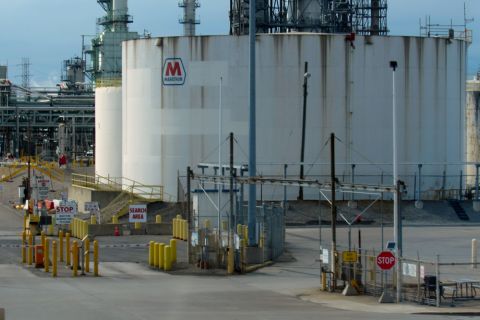
New Texas Railroad Commissioner Ryan Sitton explains his vision of Texas as global energy leader to pipeline executives in Houston. Source: Hart Energy
Just four days after being sworn in as commissioner of the Texas Railroad Commission, Ryan Sitton shared his aspirations for Texas’ world domination with pipeline industry executives.
The new commissioner, one of three elected to lead the state’s oil and gas regulatory agency, told members of the Texas Pipeline Association in Houston that he envisions a global leadership shift in the next five to 10 years if the state’s industry can continue to grow in what he termed a shortterm price challenge environment.
“I am not just talking about energy influence,” he said. “I’m talking about all around the world, people not just responding to what OPEC does but to what Texas does.”
An engineer by training and co-founder with his wife of Pinnacle AIS, an integrity and reliability company based in Pasadena, Texas, Sitton assured the group that he was aware of the implications of oil’s steep drop into the $40s per barrel.
“Obviously, our producers are going to be pulling capital off the market,” he said. “They’re going to be slowing down drilling operations, everybody knows that.”
But slower growth for the moment does not erase the massive ramp-up of production—200% since 2007—that Texas has realized through recent development of shale plays like the Eagle Ford and Permian Basin, and opportunity for the midstream beckons.
“What was the match in pipeline construction? Not even close,” Sitton said. “In that same time period, pipelines in the state of Texas went from 300,000 miles of pipeline to about 420,000 miles.
“We have a transportation problem,” he emphasized. “In order for the state of Texas and our oil to compete on a global scale, we’ve got to be able to get that oil to market, and the pipeline industry is going to be our way to do that.”
Recommended Reading
Thanks to New Technologies Group, CNX Records 16th Consecutive Quarter of FCF
2024-01-26 - Despite exiting Adams Fork Project, CNX Resources expects 2024 to yield even greater cash flow.
Cheniere Energy Declares Quarterly Cash Dividend, Distribution
2024-01-26 - Cheniere’s quarterly cash dividend is payable on Feb. 23 to shareholders of record by Feb. 6.
Marathon Petroleum Sets 2024 Capex at $1.25 Billion
2024-01-30 - Marathon Petroleum Corp. eyes standalone capex at $1.25 billion in 2024, down 10% compared to $1.4 billion in 2023 as it focuses on cost reduction and margin enhancement projects.
Humble Midstream II, Quantum Capital Form Partnership for Infrastructure Projects
2024-01-30 - Humble Midstream II Partners and Quantum Capital Group’s partnership will promote a focus on energy transition infrastructure.
Hess Corp. Boosts Bakken Output, Drilling Ahead of Chevron Merger
2024-01-31 - Hess Corp. increased its drilling activity and output from the Bakken play of North Dakota during the fourth quarter, the E&P reported in its latest earnings.






